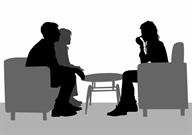Supporting Someone with Post-Traumatic Stress Disorder
Post-traumatic stress disorder (PTSD) is a mental health condition. It is more likely to start after a life-changing event or trauma. PTSD can also occur in people who hear about trauma that happens to a close family member or friend. PTSD can present in anyone at any age.
Friends and family can help someone with PTSD by being supportive and understanding.
How does PTSD affect a person?
PTSD symptoms may start soon after a traumatic event or weeks later. They can last from a month to years. Symptoms can affect relationships, work, and daily activities. They may include:
- Reliving the trauma again through:
Dreams.
Feelings of fear, terror, sadness, or anger.
Unwanted memories.
Flashbacks, or feeling like the past event is happening in the present.
- Avoiding reminders of the event. This may involve:
- Being very sensitive or reacting to certain settings. The person with PTSD may:
Be easily startled.
Engage in self-destructive behavior.
Be irritable.
Be highly stressed or feel on edge.
Have outbursts toward others.
Have trouble focusing or sleeping.
- Having negative moods and thoughts, such as:
Negative thoughts about self and others.
Stressful and negative feelings without a clear cause.
No memory of parts of the traumatic event.
Feelings of blame toward self or others.
Trouble experiencing positive feelings or events.
How is PTSD treated?
PTSD may be treated with:
Medicines to reduce PTSD symptoms.
Counseling (cognitive behavioral therapy,or CBT).
Exposure therapy. This is done by a therapist who specializes in the treatment of PTSD.
Eye movement desensitization and reprocessing (EMDR) therapy.
If your loved one has other mental health problems, they may also be treated.
What actions can I take to support a person with PTSD?

Talk about the condition
-
Be present and listen well.
-
Keep conversations positive.
-
Ask questions if you do not understand.
-
Know that it is okay for your loved one to talk about the traumatic event. You do not have to "fix" things.
Create a safe environment
For personal safety:
Encourage the person with PTSD not to drink alcohol or use illegal drugs.
Ensure your loved one has a good relationship with their mental health provider. This can help lower the risk of self-harm or suicide.
Have a time-out system that allows anyone to stop a discussion and step away to calm down when emotions are high.
Tell the mental health care provider if your loved one is often angry or violent.
For home safety:
Think about putting a security system in your loved one's home. This may help them feel safer and reduce their symptoms.
Help your loved one create a safe and healthy home setting.
If your loved one becomes angry or violent, go to a safe place and call for help. If there are children in the home, get them to a safe place as well.
Help the person look for resources
Ask your loved one's health care provider about therapists or support groups that specialize in PTSD.
If your loved one is a veteran, look for information from a local veterans organization. Call the National Caregiver Support Line to get support and resources from a social worker: 1-855-260-3274
Think about joining self-help and support groups for yourself.
Find other ways to help
Make an effort to learn about PTSD.
Ask your loved one how you can best help them.
Attend family therapy to reduce tension and stress.
Help your loved one follow their treatment plan.
Offer to come along to health care visits.
Exercise and go out with your loved one.
Encourage your loved one to talk with people they trust.
Try not to take your loved one's feelings or actions personally.
What are signs that the condition is getting worse?
PTSD may be getting worse if:
Talk to the health care provider about changing your loved one's treatment or adding more resources.
How should I care for myself?

Supporting someone with PTSD can cause stress. Find ways to care for your body and mind.
Eat a healthy diet.
Drink enough water.
Get regular exercise.
Know that the process of PTSD treatment takes time. Be patient.
Stay positive.
Make time for activities and hobbies that you enjoy.
Ask for support from family members, friends, coworkers, neighbors, support groups, or a health care provider.
-
Your loved one has thoughts about harming themselves or others.
- Your loved one is:
Acting suspicious, angry, or violent.
Having repeated flashbacks.
-
You and your loved one are having more fights.
-
Your loved one tells you that they are very depressed or anxious.
-
Your life is in danger. Leave and call for help as soon as possible.
Get help right away if you feel like your loved one may hurt themselves or others, or if they have thoughts about taking their own life. Go to your nearest emergency room or:
Summary
-
PTSD is a mental health condition. Symptoms can start after a traumatic event.
-
Treatment for PTSD may include medicines, counseling, exposure therapy, and EMDR.
-
Talk with your loved one about PTSD and its symptoms. Get information from health care providers or support groups.
-
Ensure your loved one has a good relationship with their mental health provider. This can help lower the risk of self-harm or suicide.
-
It is important to take care of yourself. Do not wait to take care of yourself if you feel like you are in danger. Get away and get help.
This information is not intended to replace advice given to you by your health care provider. Make sure you discuss any questions you have with your health care provider.

 Supporting someone with PTSD can cause stress. Find ways to care for your body and mind.
Supporting someone with PTSD can cause stress. Find ways to care for your body and mind.